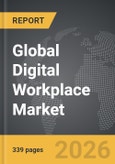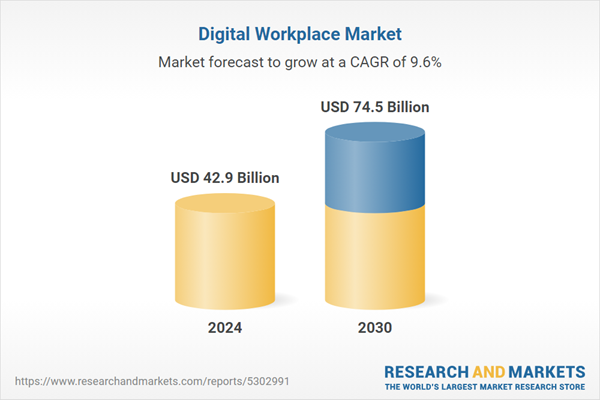Global Digital Workplace Market - Key Trends & Drivers Summarized
How Is the Digital Workplace Transforming Modern Work Environments?
The digital workplace is transforming how businesses operate by integrating digital tools, cloud solutions, and collaborative platforms to facilitate seamless communication and productivity across remote and in-office teams. With solutions like video conferencing, instant messaging, file-sharing platforms, and project management tools, employees can connect, collaborate, and complete tasks in real-time, regardless of physical location. This digital shift has allowed organizations to adopt hybrid work models, increasing flexibility and promoting a healthier work-life balance. By providing a centralized digital hub for all necessary resources, the digital workplace enables employees to access information, applications, and communication tools from anywhere, fostering a cohesive, agile work environment.The demand for digital workplaces has grown substantially, particularly in response to the COVID-19 pandemic, which accelerated remote work adoption globally. Companies now see the value in offering flexible work environments that attract top talent while boosting productivity and engagement. In addition, digital workplaces contribute to operational efficiency by streamlining workflows, reducing time spent on administrative tasks, and allowing managers to track team performance more effectively. As digital workplaces continue to evolve, they are enabling organizations to foster collaboration, maintain productivity, and promote inclusivity, making them central to the future of work.
What Role Do AI and Data Analytics Play in Enhancing the Digital Workplace?
Artificial intelligence (AI) and data analytics have become essential components of the digital workplace, optimizing processes, enhancing user experience, and enabling data-driven decision-making. AI-powered tools, such as virtual assistants and chatbots, automate routine tasks, answer common inquiries, and support employees in navigating complex processes, freeing up time for more strategic work. Additionally, AI enhances cybersecurity in digital workplaces, with algorithms that monitor for unusual behavior, protect data integrity, and prevent unauthorized access. Through automation, AI also supports HR processes, from onboarding to employee engagement, making digital workplaces more efficient and responsive.Data analytics tools within the digital workplace provide valuable insights into team performance, productivity trends, and employee engagement. By analyzing usage patterns and workflow efficiency, organizations can identify areas for improvement, optimize resource allocation, and make informed adjustments to digital workplace strategies. Moreover, predictive analytics can anticipate potential productivity bottlenecks or workflow disruptions, allowing managers to address issues proactively. As organizations strive to create personalized, productive, and secure digital workplaces, AI and data analytics are critical, enabling continuous improvement and creating environments that adapt to employee needs.
Why Are Organizations Worldwide Adopting Digital Workplace Solutions?
Organizations across industries are adopting digital workplace solutions to improve flexibility, drive innovation, and increase employee satisfaction. With remote and hybrid work models becoming more prevalent, companies need robust digital platforms that ensure seamless communication and collaboration. Digital workplace solutions enable employees to work from any location, providing easy access to essential applications and information. This flexibility not only boosts productivity but also supports employee retention, as workers increasingly prioritize flexible, technology-enabled work environments. The digital workplace also promotes inclusivity by allowing geographically dispersed teams to work together effectively, breaking down physical barriers to collaboration.Furthermore, digital workplace solutions support scalability and business continuity. Cloud-based platforms allow companies to scale their digital infrastructure according to changing needs, while ensuring data accessibility and security. The shift to digital workplaces is also driven by a growing emphasis on employee well-being, as companies seek to offer tools that streamline tasks, minimize stress, and promote a balanced work-life approach. This adoption trend reflects an evolving understanding of the workplace as a dynamic, people-centered environment, with digital tools playing a crucial role in shaping the modern work experience and fostering long-term success.
What Is Driving Growth in the Digital Workplace Market?
The growth in the digital workplace market is driven by several factors, including the widespread shift to remote and hybrid work models, as companies seek flexible solutions that support distributed teams. The demand for tools that enable real-time collaboration, streamline communication, and support seamless project management has grown as organizations recognize the productivity and engagement benefits of a well-integrated digital workplace. Advancements in cloud computing have further propelled this growth, offering scalable, cost-effective solutions that allow businesses to adapt quickly to evolving operational needs. Additionally, security concerns associated with remote work are driving the adoption of secure digital workplace solutions with features like multi-factor authentication and encrypted data storage.Emerging technologies, such as AI, machine learning, and data analytics, are also fueling the digital workplace market by enhancing productivity, personalizing employee experiences, and supporting decision-making. The demand for digital workplace solutions is further supported by a focus on employee well-being and work-life balance, as companies implement tools that streamline workflows and promote efficiency. Regulatory compliance, especially regarding data privacy in remote work, is another growth driver, as digital workplaces help companies meet compliance standards and protect sensitive information. As organizations strive to create adaptable, efficient, and secure work environments, the adoption of digital workplace solutions is set to expand, becoming a central element of modern business strategies.
Report Scope
The report analyzes the Digital Workplace market, presented in terms of market value (US$ Thousand). The analysis covers the key segments and geographic regions outlined below.- Segments: Component (Services, Solutions); End-Use (IT & Telecom, Healthcare & Pharmaceuticals, Retail & Consumer Goods, BFSI, Manufacturing, Other End-Uses).
- Geographic Regions/Countries:World; United States; Canada; Japan; China; Europe (France; Germany; Italy; United Kingdom; Spain; Russia; and Rest of Europe); Asia-Pacific (Australia; India; South Korea; and Rest of Asia-Pacific); Latin America (Argentina; Brazil; Mexico; and Rest of Latin America); Middle East (Iran; Israel; Saudi Arabia; United Arab Emirates; and Rest of Middle East); and Africa.
Key Insights:
- Market Growth: Understand the significant growth trajectory of the Digital Workplace Services segment, which is expected to reach US$44.3 Billion by 2030 with a CAGR of a 9.5%. The Digital Workplace Solutions segment is also set to grow at 9.8% CAGR over the analysis period.
- Regional Analysis: Gain insights into the U.S. market, valued at $11.1 Billion in 2024, and China, forecasted to grow at an impressive 13.1% CAGR to reach $17.3 Billion by 2030. Discover growth trends in other key regions, including Japan, Canada, Germany, and the Asia-Pacific.
Why You Should Buy This Report:
- Detailed Market Analysis: Access a thorough analysis of the Global Digital Workplace Market, covering all major geographic regions and market segments.
- Competitive Insights: Get an overview of the competitive landscape, including the market presence of major players across different geographies.
- Future Trends and Drivers: Understand the key trends and drivers shaping the future of the Global Digital Workplace Market.
- Actionable Insights: Benefit from actionable insights that can help you identify new revenue opportunities and make strategic business decisions.
Key Questions Answered:
- How is the Global Digital Workplace Market expected to evolve by 2030?
- What are the main drivers and restraints affecting the market?
- Which market segments will grow the most over the forecast period?
- How will market shares for different regions and segments change by 2030?
- Who are the leading players in the market, and what are their prospects?
Report Features:
- Comprehensive Market Data: Independent analysis of annual sales and market forecasts in US$ Million from 2024 to 2030.
- In-Depth Regional Analysis: Detailed insights into key markets, including the U.S., China, Japan, Canada, Europe, Asia-Pacific, Latin America, Middle East, and Africa.
- Company Profiles: Coverage of players such as Accenture, ATOS, Capgemini, Citrix, Cognizant and more.
- Complimentary Updates: Receive free report updates for one year to keep you informed of the latest market developments.
Some of the 96 companies featured in this Digital Workplace market report include:
- Accenture
- ATOS
- Capgemini
- Citrix
- Cognizant
- Compucom
- Computacenter
- DXC Technology
- Getronics
- HCL
- IBM Corporation
- NTT Data
- Stefanini
- TCS
- Unisys
- Wipro
This edition integrates the latest global trade and economic shifts into comprehensive market analysis. Key updates include:
- Tariff and Trade Impact: Insights into global tariff negotiations across 180+ countries, with analysis of supply chain turbulence, sourcing disruptions, and geographic realignment. Special focus on 2025 as a pivotal year for trade tensions, including updated perspectives on the Trump-era tariffs.
- Adjusted Forecasts and Analytics: Revised global and regional market forecasts through 2030, incorporating tariff effects, economic uncertainty, and structural changes in globalization. Includes historical analysis from 2015 to 2023.
- Strategic Market Dynamics: Evaluation of revised market prospects, regional outlooks, and key economic indicators such as population and urbanization trends.
- Innovation & Technology Trends: Latest developments in product and process innovation, emerging technologies, and key industry drivers shaping the competitive landscape.
- Competitive Intelligence: Updated global market share estimates for 2025, competitive positioning of major players (Strong/Active/Niche/Trivial), and refined focus on leading global brands and core players.
- Expert Insight & Commentary: Strategic analysis from economists, trade experts, and domain specialists to contextualize market shifts and identify emerging opportunities.
Table of Contents
Companies Mentioned (Partial List)
A selection of companies mentioned in this report includes, but is not limited to:
- Accenture
- ATOS
- Capgemini
- Citrix
- Cognizant
- Compucom
- Computacenter
- DXC Technology
- Getronics
- HCL
- IBM Corporation
- NTT Data
- Stefanini
- TCS
- Unisys
- Wipro
Table Information
| Report Attribute | Details |
|---|---|
| No. of Pages | 339 |
| Published | February 2026 |
| Forecast Period | 2024 - 2030 |
| Estimated Market Value ( USD | $ 42.9 Billion |
| Forecasted Market Value ( USD | $ 74.5 Billion |
| Compound Annual Growth Rate | 9.6% |
| Regions Covered | Global |









